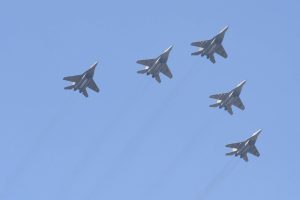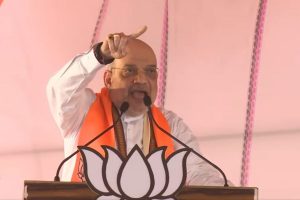Queen Elizabeth II on Friday invoked the wartime spirit to “never despair” as Britain marked 75 years since the end of World War II in Europe under the shadow of coronavirus.
The 94-year-old delivered a televised address to the nation designed to echo that of her father, king George VI, who gave his own speech on the radio on the evening of May 8, 1945.
Advertisement
“At the start, the outlook seemed bleak, the end distant, the outcome uncertain,” the queen said of the war, in which she served as a driver in the army.
“But we kept faith that the cause was right, and this belief, as my father noted in his broadcast, carried us through.
“Never give up, never despair — that was the message of VE Day.”
She recalled the millions of people who died “so we could live as free people in a world of free nations”, saying, “We should, and will, remember them.”
The monarch added: “The greatest tribute to their sacrifice is that countries who were once sworn enemies are now friends, working side by side for the peace, health and prosperity of us all.”
Her message was filmed at Windsor Castle, where she and her husband Prince Philip have been staying since the coronavirus outbreak began.
Plans for street parties and military parades for VE Day were cancelled after the British government ordered a nationwide lockdown in late March to slow the spread of COVID-19.
But it encouraged people to hold 1940s tea-parties at home, and to join in a mass sing-a-long of wartime classic “We’ll Meet Again” from their doorsteps after the queen’s speech.
“Our streets are not empty; they are filled with the love and the care that we have for each other,” the monarch said.
“And when I look at our country today and see what we are willing to do to protect and support one another, I see with pride that we are still a nation that those brave soldiers, sailors and airmen would recognise and admire.
“I send my warmest good wishes to you all.”
– ‘Tide of happiness’ –
In 1945, the queen — then a 19-year-old princess — left Buckingham Palace to join the celebrations on the streets of London with her younger sister Margaret and a group of friends.
In a 1985 BBC interview, re-released for this year’s anniversary, she described it as “one of the most memorable nights of my life”.
“I remember lines of unknown people linking arms and walking down Whitehall, all of us just swept along on a tide of happiness and relief,” she recalled.
The young princess wore her uniform — she was a member of the Auxiliary Territorial Service (ATS) — but “I remember we were terrified of being recognised”.
















